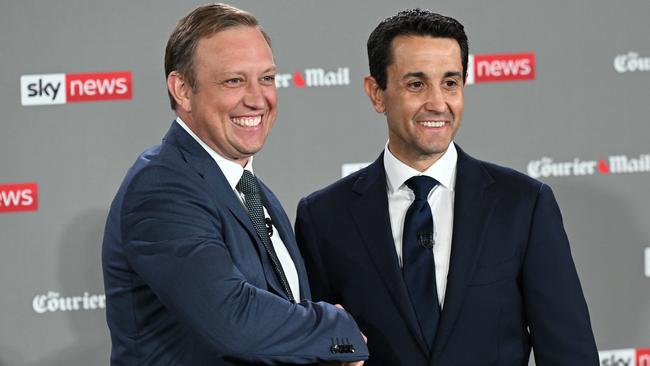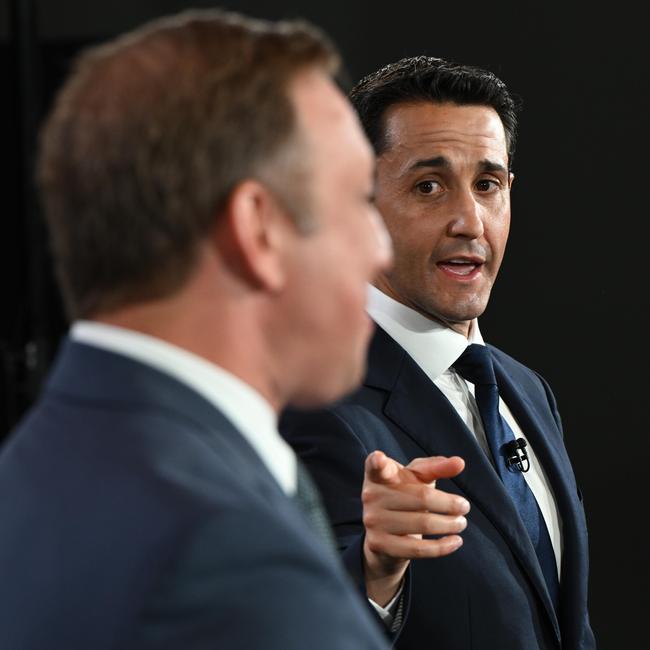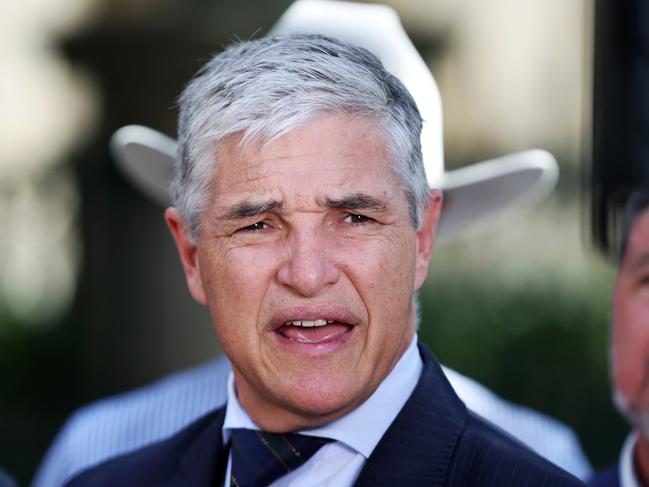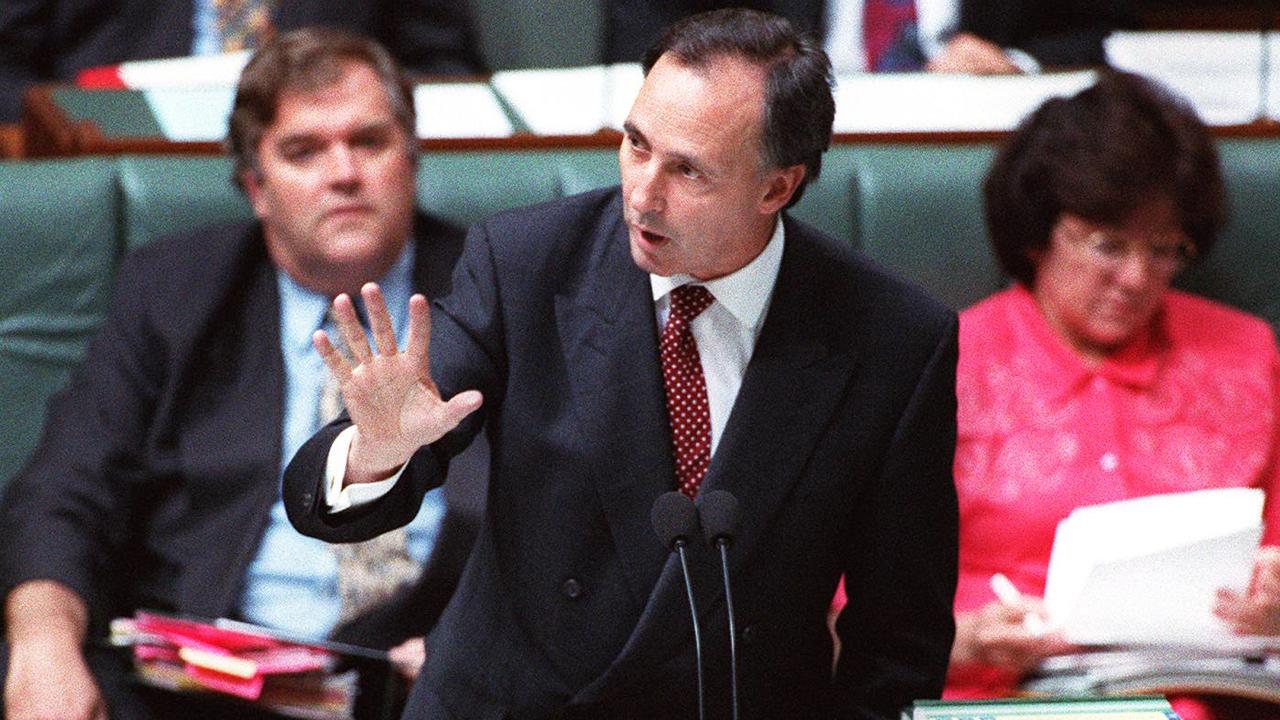Opinion: Election campaign less presidential, more issues-based
That David Crisafulli has lost most of his lead as preferred premier reminds us that campaigns still matter, writes Paul Williams.

QLD Votes
Don't miss out on the headlines from QLD Votes. Followed categories will be added to My News.
I’ve been involved in 15 Queensland state election campaigns going back to 1983, and I can honestly say 2024 is one of the most unusual I’ve ever seen.
First, while leadership has been important, the campaign hasn’t really been the “presidential” contest between Premier Steven Miles and Opposition leader David Crisafulli we all expected.
Instead, it’s been an issue-based campaign (as it should be) where policies – or the absence of them – have dominated.
Those issues, of course, have been cost-of-living and youth crime first, with hospital ramping, housing and Olympic Games planning close behind.
Second, despite lies and scare campaigns from both sides – and some snarky remarks from both leaders – this campaign has been comparatively civil.
Like the Perrottet-Minns contest in New South Wales last year, this proves personal insults can be avoided.
Third, one would expect the campaign of a tired-looking government grappling with crises and expecting annihilation to be weak, feckless and dispirited.
But Labor’s campaign has been textbook: energetic, on message with measured pledges, and almost gaffe-free.
The Liberal National Party’s campaign hasn’t been bad – and leader David Crisafulli has mostly performed well – but, for reasons outlined below, two key LNP weaknesses have been savagely exposed.
And that leads to a fourth: the unexpected turnaround in the opinion polls.
As above, and considering the polls since February, we’ve all been expecting a Labor thrashing – perhaps not as bad as the 2012 Newman rout, but a thumping nonetheless.
Just a couple of months ago, for example, a Resolve Strategic poll pegged Labor’s primary vote at just 23 per cent (lower than Anna Bligh’s 2012 wipeout), with the LNP on 44, for an after-preference split of 58.5 to 41.5 per cent. That would have given the LNP 65 of the parliament’s 93 seats.
This week, Resolve Strategic found Labor’s primary vote surging to 32, with the LNP’s shrinking to 40.

After preferences, the race is tighter: 53 for the LNP and 47 for Labor – just enough seats to see Crisafulli fall over the line into majority government.
Astonishingly, a minority LNP government relying on Katter’s Australian Party support, while unlikely, is no longer impossible.
Voters’ rating of the leaders has been just as remarkable.
Where, in September, Crisafulli led Miles as preferred premier by 13 points, today Crisafulli leads by just two.
Such numbers remind us that campaigns – and the issues that fuel them – still matter.
So what happened?
The LNP and David Crisafulli went into this campaign – an election that was theirs to lose – with two Achilles’ heels.
The first, criticised by even conservative voters, was the Opposition’s almost non-existent policy platform.
Of course, all oppositions want to keep their head below the parapet, but there is such a thing as being too policy-lite, especially when voters see a carping opposition like an old complaining uncle: very good at finding fault, but never offering meaningful solutions.
Voters are not dills. As much as they’re angry about inflation, housing and crime – problems confronting every state and territory – smart voters will baulk at signing a blank cheque to drive a party for four years with no upper house to serve as a brake.

The LNP’s second weakness was exposed by Robbie Katter’s release of the abortion genie from the LNP’s tightly closed campaign bottle.
At its most basic level, the fact widely supported abortion laws could be repealed seven years after their passing has spooked voters – both women and men in the southeast and in the regions – who wonder what century some Queensland pollies live in.
But, at another level, the mixed messaging across the LNP – leader Crisafulli insists “no change” but some LNP candidates have privately expressed a desire for change – indicates a party deeply divided between its moderate and conservative wings and, worse, perhaps held captive by a powerful Christian lobby.
And that, in turn, raises questions as to how policy – on everything from voluntary assisted dying laws to climate change targets – will be made in an LNP government where Crisafulli, a moderate, is in the minority.
Queenslanders face a tough decision: reward a government they know for saving thousands of lives during the pandemic, and now offering cost-of-living relief, or punishing that government for crises many feel have made their lives harder?
Or do they reward an opposition for choosing a sensible moderate leader who appears on top of his brief, or punish that opposition for trying to slip into government with too few tangible plans?
The fact the choice is yours is what makes our democracy so vibrant.
Paul Williams is an associate professor at Griffith University




